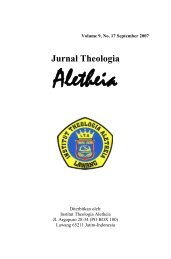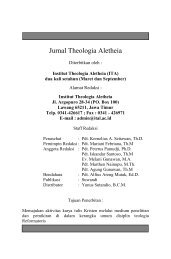download - Sekolah Tinggi Theologia Aletheia Lawang
download - Sekolah Tinggi Theologia Aletheia Lawang
download - Sekolah Tinggi Theologia Aletheia Lawang
You also want an ePaper? Increase the reach of your titles
YUMPU automatically turns print PDFs into web optimized ePapers that Google loves.
70<br />
expected of us on each subject. Both the context of the expositions<br />
and their content do not yet reflect Calvin‘s so-called ―third use of<br />
the law.‖ The law as a guide for gratitude was a later development<br />
in his thought.<br />
For young Calvin there was already a well developed sense<br />
that obedience is not mere external conformity to conscience and<br />
the written law of God. He summarizes his exposition of the law,<br />
saying, ―He lives the best and holiest life who lives and strives for<br />
himself as little as he can; and . . . no one lives in a worse of more<br />
evil manner than he who lives and strives for himself alone, and<br />
thinks about and seeks only his own advantage.‖ 77 Thoughts as<br />
well as ―inward affections‖ are commanded and forbidden the law,<br />
he adds. Paul calls the law ―spiritual‖ in Romans 7:14 because it<br />
demands obedience of the mind, soul, and will as well as external<br />
conformity to the law. Keeping the law in this way is neither<br />
optional nor advisory, as some say; it is obligatory for all. Nor<br />
does keeping the law partially suffice, as others contend. Divine<br />
righteousness demands ―what is whole and perfect, and<br />
uncorrupted by any filth.‖ 78 But nothing we offer is. Even if<br />
people were capable of partially perfect obedience, partial<br />
righteousness cannot and does not compensate for even one sin.<br />
Thus, all are at enmity with God. The law demonstrates, therefore,<br />
that all people are under God‘s curse and condemnation. It is only<br />
through faith in Christ that we acquire liberation from the<br />
condemning power and bondage of the law. Salvation rests on<br />
God‘s righteousness in keeping his promises, not on our<br />
righteousness in keeping the law. ―By Christ‘s righteousness then<br />
are we made righteous and become fulfillers of the law,‖ he<br />
concludes. 79<br />
From what he has said to this point in the first chapter of his<br />
1536 edition of The Institutes, Calvin suggests that there are three<br />
uses of the law. First, it convicts us of sin. Second, it restrains or<br />
77 Calvin, Institutes of the Christian Religion—1536 Edition, p.29.<br />
78 Ibid., p.31.<br />
79 Ibid., p.34.




